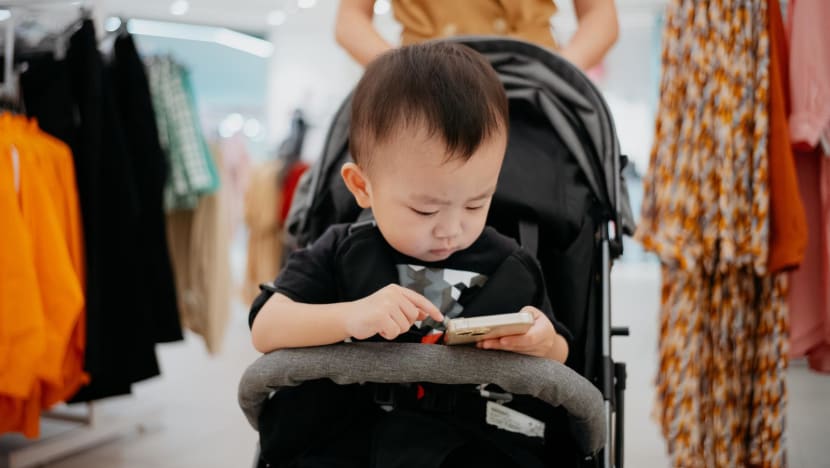Commentary: We simply cannot leave our kids to their own devices
There are growing calls across the world to ban smartphones in schools and restrict youngsters from social media. In addressing the youth mental health crisis linked to phone usage, parents play a more critical role, says NTU lecturer and parent Ian Tan.

File photo. More attention needs to be paid to the role that parents play in unhealthy screen usage, says NTU lecturer and parent Ian Tan. (Photo: iStock/hxyume)

This audio is generated by an AI tool.
SINGAPORE: Growing concern for youth mental health is prompting several countries to impose a new wave of restrictions on smartphone use in classrooms and to limit social media access for adolescents.
In June, United States Surgeon General Dr Vivek Murthy announced that he would push for health warning labels on social media platforms to warn parents of the risk of “significant mental health harms for adolescents”.
Over the last few months, several states and districts in the US have also moved to ban smartphones in schools, in efforts to help students focus in class and engage more with each other.
New York governor Kathy Hochul has also signed a Bill that will require social media platforms to restrict "addictive feeds" for users under 18, unless parental consent is granted. Under this law, kids will not receive algorithmically driven feeds; they will get posts only from accounts they follow.
These moves come a year after UNESCO’s recommendation that all schools should ban smartphones to tackle classroom disruption, improve learning and help protect children from cyberbullying. UNESCO is the United Nations’ education, science and culture agency.
China, France, Finland, Italy and most recently the Netherlands have already banned smartphones in their schools. The UK is also reportedly considering similar action.
In Singapore, there is no blanket ban of smartphones in schools, although many schools do not allow these devices to be used in class.
GETTING KIDS OFF SMARTPHONES
It’s unlikely these bans will stop kids from doomscrolling outside of school hours. And even if governments can get the likes of Meta and TikTok to age-gate their platforms, it won’t be long before another alternative arises to enthral youngsters.
As a father and an educator, I believe that more attention needs to be paid to the role that parents play. After all, it is parents, not schools, who usually first expose kids to the addictive technologies.
In fact, the average age a child here gets their first internet-connected device is eight years old, according to a survey in 2019. This is two years earlier than the global average of 10 years old. Post-COVID, it’s likely this age is even lower.
A separate survey by KK Women's and Children's Hospital (KKH) in 2022 showed that most children aged three to seven in Singapore get excessive screen time.
Take a look around when you are outdoors or taking public transport. So many adults are glued to their phone screens, and many "petextrians" cross the road without even looking up.
Unfortunately, many adults believe it is alright to let their kids do the same. I always feel sad when I see toddlers in strollers staring at a propped-up smartphone.
Indeed, have we been good role models, and have we guided our children on how to use the most addictive technologies of our times?
HOW MUCH SCREEN TIME IS TOO MUCH?
To minimise unhealthy screen usage, the Ministry of Health issued guidelines in March 2023 recommending that children under 18 months should not have any screen time. Those aged between 18 months and 36 months should have no more than one hour a day.
I wish there were guidelines on total screen time use for children above three, but that may already be in the works.
On Jun 21, Health Minister Ong Ye Kung and Minister for Social and Family Development Masagos Zulkifli said in separate Facebook posts that initiatives to deal with device usage will be announced in the coming months.
“Electronic devices and social media have become part of our lives. Our young need to use them properly, to enhance their lives, and not inadvertently undermine their mental wellness. We will need more decisive and effective measures to shape the habit of device usage.”
Authorities are also developing a new regulatory code to require app stores to implement measures to verify the age of users, so that children will be protected from downloading age-inappropriate apps.
In the meantime, consider the advice from social psychologist Jonathan Haidt who wrote the book The Anxious Generation. He recommends that children not be given smartphones until they are in secondary school.
Some may say that their children need to have smartphones as they are needed for class interactions, or for parents to keep track of their children when they travel alone. I agree, but we have to consider the documented downsides of early smartphone use.
When my children, now 19 and 21, were in primary school, my wife and I gave them “dumb phones” with no internet access. They could make phone calls to their friends and family, but not surf the web or social media.
BE WARY OF DEMONISING TECHNOLOGY
While excessive screen time is harmful, parents should not swing to the other extreme of not letting kids go online or use the latest tools.
Recently, I was surprised when a friend told me that she bans her 14-year-old from using YouTube (on top of a total ban on social media).
“But there are so many educational channels on YouTube,” I said. “It’s not all mindless entertainment.”
I then shared with her the YouTubers I follow to learn more about science, technology and communication. It was her turn to be surprised because she had never viewed YouTube as a channel for self-learning.
Adults need to keep up with technology if we are to guide our children in using it. And alas, I am not exempt from being an old fuddy-duddy.
When I started teaching at Nanyang Technological University last year, I would ask my students to close the lid of their laptops during class so that they would not be distracted.
I stopped doing after a few lessons because I realised many of them used their laptops or tablets to take notes. Using pen and paper was an alien concept to many of them - their digital notes are accessible anywhere and on any device.
The rapid advance of generative AI is also transforming the way kids learn. How should teachers assess students who can complete their assignments with just a few text prompts? Do parents still need to send their kids for tuition when we can ask ChatGPT to solve math problems?
LISTEN: What medicine knows about screen time's impact on childhood development
STRIKING THE RIGHT BALANCE
To help our children find the right balance, families can start by putting away our devices and setting aside time for daily meals together.
During my family’s dinner time, we chat about what goes on in our lives - both offline and online. My children may bring up the challenges they face in their online worlds. In turn, my wife and I share our perspectives to help them think through things.
I remember when my daughter was 15 and getting upset over rude comments from strangers on selfies she had posted on Instagram.
I told her, “Why do we put up selfies? Because we want people to like us, right? But what is the value of a “like” or a comment when these strangers don’t even know us? And how is posting selfies helping your grades?”
After that conversation, my daughter developed habits like posting selfies mainly to friends, and deleting Instagram whenever she needed to focus on her studies.
I am also constantly being educated by my children on the latest online trends so I don’t embarrass myself in front of my undergrad students.
Parenting is tougher than ever, but we have to introduce smartphones to our kids at the right time and be equipped with enough knowledge of technology to guide them through the online maze.
In every sense of the phrase, we simply cannot leave our kids to their own devices.
Ian Yong Hoe Tan is a strategic communications lecturer at the Wee Kim Wee School of Communication and Information, Nanyang Technological University. He has more than two decades of experience working in the media and technology industries.


















